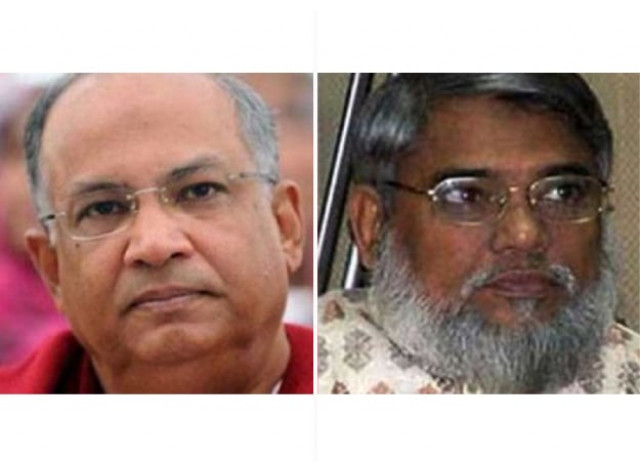Bangladesh opposition leaders on death row seek pardon
Ali Mujahid and Salahuddin Chowdhury are facing execution for their roles in 1971 independence war

Ali Ahsan Mohammad Mujahid (R) and Salahuddin Quader Chowdhury (L). PHOTO: AFP
Ali Ahsan Mohammad Mujahid and Salahuddin Quader Chowdhury, facing execution for their roles in Bangladesh's 1971 independence war with Pakistan, have sent mercy pleas to the home ministry, Anisul Huq told AFP.
"It won't be treated as a mercy petition by an ordinary condemned prisoner, which means it will be treated on an urgent basis," the minister said.
Bangladesh court upholds opposition leaders' death sentences
The two leaders have exhausted all legal appeals to avoid execution and their fate now rests with President Abdul Hamid, who has the power to pardon or commute the death sentences of any convict.
Mujahid, 67, is the second most senior member of Bangladesh's largest Islamist party, Jamaat-e-Islami, while Chowdhury, 66, is an ex-lawmaker and a top aide to Khaleda Zia, leader of the main opposition Bangladesh Nationalist Party.
Bangladesh's Supreme Court on Wednesday dismissed their final legal appeals, upholding the leaders' death sentences originally handed down by a controversial war crimes tribunal in 2013.
The president will seek advice from Prime Minister Sheikh Hasina before making a decision, Huq said, adding the Supreme Court's decision to uphold the sentences "reflected the desire of the country".
Fair trial in Bangladesh: Khakwani seeks world intervention
Mujahid's son, however, questioned whether his father had in fact sought mercy from the president.
"To seek mercy is to admit guilt. But my father has all along said that he is innocent, innocent, innocent," Al Ahmad Mabrur, the condemned man's youngest son, told AFP.
Chowdhury's son Humam Quader Chowdhury also cast doubt on the mercy plea.
"Until I hear it from my father, I refuse to believe anything the government says. It's an attempt to humiliate him," he said.
The pair are among more than a dozen leaders of the opposition alliance convicted by a tribunal set up by the secular government in 2010.
BNP leader’s case: Bangladesh govt bans entry of Pakistani witnesses
The convictions triggered the country's deadliest violence since independence, with some 500 people killed, mainly in clashes between Jamaat-e-Islami activists and police.
There are fears the latest verdicts could spark fresh unrest in the Muslim-majority nation, which is reeling from a string of killings of secular bloggers as well as the murders of two foreigners in recent months.
Jamaat called a nationwide strike on Thursday, declaring Mujahid's original trial "farcical" and "aimed at eliminating" the party's leadership.
International rights groups and legal experts have also criticised the trial, saying it fell short of international standards.
On Friday New York-based Human Rights Watch asked Bangladesh to halt the "imminent executions" of Mujahid and Chowdhury, citing "serious fair trial concerns surrounding their convictions".



















COMMENTS
Comments are moderated and generally will be posted if they are on-topic and not abusive.
For more information, please see our Comments FAQ